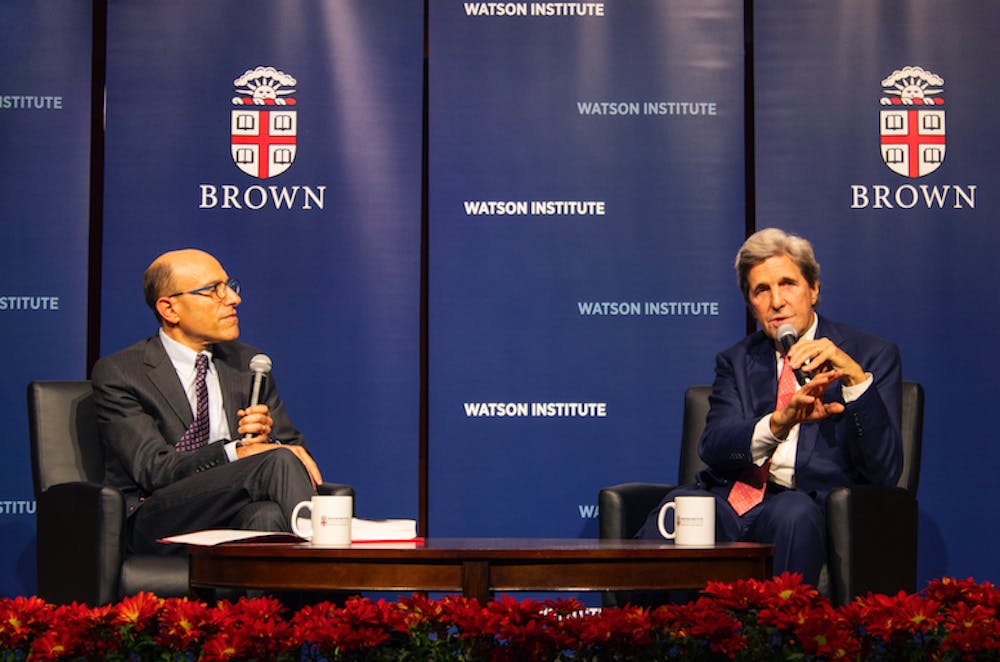John Kerry, former secretary of state and long-time senator, spoke to a packed audience in Salomon Hall this Wednesday. In a wide-ranging talk moderated by Director of the Watson Institute Edward Steinfeld, Kerry highlighted his personal experiences as a soldier in Vietnam and as a legislator. He drew on his background to comment on current topics such as the Kavanaugh confirmation, the upcoming midterm elections and climate change.
After easing the crowd with light-hearted jokes about the Boston Red Sox and Al Forno, an institution in Providence’s restaurant scene, Kerry gave a broad overview of his political trajectory, tracing his path from the rivers of Vietnam to the chambers of the Senate.
Kerry drew upon stories from his recently published book, “Every Day is Extra,” to describe an optimistic future for bipartisanship in Washington. Despite an increasingly bitter relationship between Republicans and Democrats, “the Senate is not irretrievably broken,” he said. He added that though some have criticized Senate rules for creating partisanship, the real responsibilty for gridlock and animosity between the parties lies with those currently in office. Kerry used this explanation as a call to action to drive people to the polls next month.
Kerry also tried to explain the factors behind Donald Trump’s presidency and the current political climate. “American voters are pissed off,” he said. He cited broken communities, the bad economy and differences between the coasts and heartland of the country as drivers of polarization. In turn, voters were pulled to divergent ends of the political spectrum and voted for Bernie Sanders and Donald Trump, he said.
Considerable speaking time was also devoted to a passionate discussion of climate change. Kerry said this issue is one of the most important global needs and emphasized recent extreme weather events as only the beginning of a potentially grim future. He pushed the economic market as one of the potential solutions. The solution to climate change is “the mother of all markets,” Kerry said, pointing out huge growth in wind and solar energy revenues. He criticized President Trump’s climate record and scorned his decision to remove the United States from the Paris Accords, which Kerry helped negotiate.
Kerry addressed a number of questions from the audience, which ranged from the impact of automation on the workforce to the connection between the wars in Vietnam and Afghanistan.
When discussing automation, he pointed out that despite the massive gains in efficiency that have been brought about by changes in recent decades, researchers have yet to come to an agreement on how many workers will be impacted by artificial intelligence and other such technology.
On the connection between Vietnam and Afghanistan, Kerry felt strongly that there was little in common between the two. The war in Vietnam was “based upon a lie,” Kerry said, while the United States entered Afghanistan seeking to find those behind the 9/11 attacks. He added that unlike in Vietnam, prematurely pulling troops out of Afghanistan would lead to a collapse of the country’s political and economic systems. He emphasized that the United States should pull out of Afghanistan but only after a successful transition over to stable Afghani institutions.
While wrapping up his commentary, Kerry stressed the importance of the midterm elections and the crucial role that students will play in it. “We need you. No student is exempt from the responsibility of citizenship,” he said.
Kerry came across as surprisingly strong on climate change, said Chloe Khosrowshahi ’22, who attended the talk. However, she felt that Kerry heavily emphasized energy’s role in reducing carbon emissions but dismissed other important factors such as agriculture and overfishing.
Micah Bruning ’22 was more critical of Kerry and said that his comments felt like “empty political rhetoric,” repeating many of the same stories that have been told by politicians for years.





